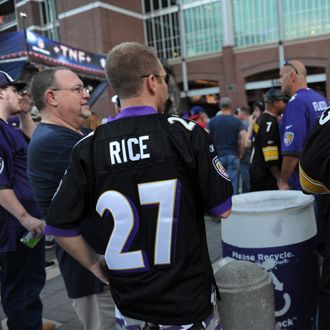
Over at Time, Megan Gibson argues that the ongoing existence of Ray Rice supporters can be explained, at least in part, by “the kind of God-like status our society gives to professional athletes.” I actually don’t think that’s a primary cause of this weird behavior. A simpler, more convincing explanation is “motivated reasoning,” and you’d be just as likely to see it show up, in a similar form, in a case involving an abuser who wasn’t famous at all.
Motivated reasoning, stated fancily, “refers to the unconscious tendency of individuals to process information in a manner that suits some end or goal extrinsic to the formation of accurate beliefs.” That is, it’s when you form an argument ass-backwards — you determine unconsciously what conclusion you want to reach and then “evaluate” the evidence at hand in a very selective, biased way that ensures you reach that conclusion. We all do this.
Those few Ravens fans still sporting Rice jerseys are engaging in a potent strain of motivated reasoning. Many of them have spent years admiring Rice and feeling a sense of connection to him, and now, all of a sudden, a horrifying video and subsequent wave of national outrage are calling into question a small but rather well-cemented aspect of who they are. Check out this Fox Sports video (hat tip to Deadspin) in which these dead-enders explain themselves, which would be psychologically fascinating if it weren’t so hard to watch:
My favorite (or “favorite”) is the first lady interviewed, who says, “I don’t believe in domestic violence, but I will say: any woman who can hit a man, a man shouldn’t have to sit there and take the abuse. The abuse goes both ways.” She’s clearly not watching the same video as the rest of us — desperate not to see Rice’s actions as abominable, her brain has constructed a version of events in which there’s some degree of reciprocity between the violence Rice and his then-fiancée inflicted on each other. Based on the video, that couldn’t be further from the truth.
The reason this isn’t really about athlete fame is that you see the same thing in cases where, say, family members of someone who did something horrible downplay the significance of the event, or deny it happened altogether. It’s not fun, psychologically speaking, when someone whom we’ve spent a huge amount of time thinking about in a positive light — whether a family member or an athlete — turns out not to be who we thought they were. To wriggle out of this cognitive dissonance, our brains will spin some rather wild tales.




